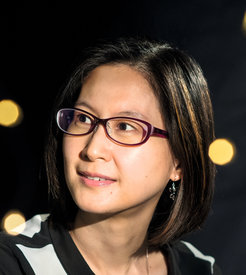Sherry Suyu selected as Max Planck Fellow
Former MPA research group leader Sherry Suyu has been selected as a Max Planck Fellow to complement her recent appointment as associate professor at the Technical University of Munich (TUM). For the next five years, she will continue to lead a small working group at MPA to use gravitational lensing as a probe of cosmology and astrophysics.

Sherry Suyu is Professor for Observational Cosmology at the Technical University of Munich (TUM). Since 2016, she was a Max Planck Research Group Leader at the Max Planck Institute for Astrophysics (MPA) and was recently promoted to become an associate professor at TUM as part of the Max Planck@TUM programme.
The MPA has nominated Suyu in the 14th call for applications of Max Planck Fellowship, a programme created to strengthen the connection between outstanding university teachers and Max Planck Institutes. She was selected among the nominees by the MPG and will start her appointment as a Max Planck Fellow in October 2022 for a period of five years. In addition to her TUM professorship, she will lead a small working group at MPA. Through spectacular gravitational lensing effects, the research group is shedding light on the dark cosmos: dark energy, dark matter and supermassive black holes. The group also works on the extremely bright side of the Universe in observing splendid cosmic fireworks from supernovae.
Suyu earned her bachelor of science degree in astrophysics at Queen’s University, Canada, in 2001 and her PhD in physics at Caltech in 2008. Then came postdoctoral stints at the University of Bonn, Germany; the University of California, Santa Barbara; and Stanford University. She became affiliated with Academia Sinica in 2013 and began joint appointments at MPA and TUM in 2016. In 2017, she obtained an ERC Consolidator Grant to study gravitationally lensed supernovae and find out more about their progenitors. She received the 2021 Lancelot M. Berkeley–New York Community Trust Prize for Meritorious Work in Astronomy.












